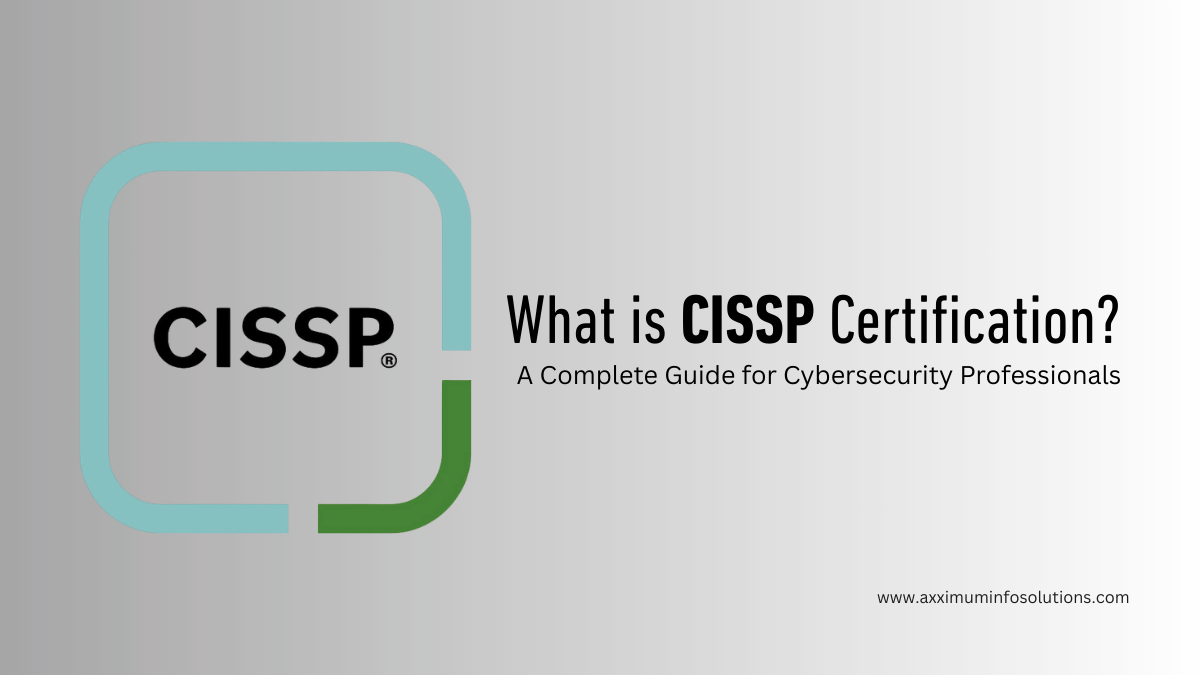What is CISSP Certification? A Complete Guide for Cybersecurity Professionals
What is CISSP Certification?
COMPLETE guide to CISSP Certification
A Complete Guide for Cybersecurity Professionals in 2025
In today’s digital world, cybersecurity has become one of the most in-demand career fields. With rising data breaches and security threats, organizations are constantly looking for professionals who can safeguard their digital assets. If you’re planning to build a career in cybersecurity, the CISSP Certification (Certified Information Systems Security Professional) is one of the most globally recognized credentials you must consider.
In this guide, you’ll learn:
- What is the CISSP certification?
- Why it’s valuable for your career
- What are the 8 CISSP domains (explained in detail)
- Who should apply?
- And how Axximum Infosolutions – Best CISSP Training Institute in Mumbai, can help you crack the exam in your first attempt.
🔐 What is CISSP Certification?
CISSP is a globally recognized certification offered by (ISC)² (International Information System Security Certification Consortium). It validates your expertise in designing, implementing, and managing a best-in-class cybersecurity program.
Whether you’re a Security Analyst, Risk Manager, or IT Director, CISSP demonstrates that you have the skills required to protect an organization’s critical data.
🎯 Why is CISSP Important?
- 🌍 Recognized in over 160+ countries
- 💼 Opens doors to senior-level roles like CISO, Security Manager, or Consultant
- 📈 Boosts salary and market value
- 💡 Builds deep technical and managerial knowledge
- 🛡 Helps organizations meet compliance and regulatory standards
📘 CISSP Certification Domains Explained – Axximum Infosolutions
CISSP syllabus is divided into 8 domains under the CBK (Common Body of Knowledge) framework. Let’s understand each domain in simple language:
1. Security and Risk Management
This is the foundation domain. It covers:
- Confidentiality, Integrity, and Availability (CIA triad)
- Security governance and compliance
- Risk analysis and mitigation
- Ethics, policies, and procedures
✅ Why it matters: A secure organization starts with strong policies and risk control. This domain teaches you how to build them.
2. Asset Security
Here, you learn to:
- Identify and classify information (Public, Private, Confidential)
- Protect data through encryption and secure handling
- Ensure proper data lifecycle management
✅ Why it matters: You must know where your data is, who owns it, and how it’s protected.
3. Security Architecture and Engineering
A technical domain focused on:
- Secure network architecture and system design
- Cryptography and secure protocols
- Security models and hardware-based security
✅ Why it matters: You build systems that are secure by design.
4. Communication and Network Security
Learn how data travels across networks securely. Includes:
- Secure network design (Firewalls, VPNs, IDS/IPS)
- Secure communication protocols (SSL/TLS)
- Wireless and VoIP security
✅ Why it matters: A single weak link in communication can lead to big breaches.
5. Identity and Access Management (IAM)
IAM ensures only the right people access the right resources. It includes:
- Authentication (Passwords, Biometrics, 2FA)
- Authorization models (RBAC, ABAC)
- Account lifecycle and identity federation
✅ Why it matters: Control who gets in and what they can access.
6. Security Assessment and Testing
You’ll learn how to:
- Conduct security audits and penetration tests
- Evaluate system vulnerabilities
- Perform continuous security monitoring
✅ Why it matters: Regular testing helps detect weaknesses before attackers do.
7. Security Operations
This domain is all about incident detection and response. Includes:
- Security event monitoring (SIEM)
- Forensics and disaster recovery
- Patch and vulnerability management
✅ Why it matters: Your job doesn’t end at prevention. You must react swiftly when things go wrong.
8. Software Development Security
This is focused on secure software practices:
- Secure coding techniques (OWASP Top 10)
- Software development lifecycle (SDLC)
- Code review and vulnerability management
✅ Why it matters: Applications are often targeted. Secure development is a must.
🧑🎓 Who Should Pursue CISSP?

CISSP is ideal for:
- Network & Security Engineers
- IT Managers & Consultants
- Security Analysts
- Risk Managers
- Cybersecurity Enthusiasts aiming for leadership roles
Eligibility:
Minimum 5 years of full-time work experience in 2 or more of the 8 domains
(1 year waived if you hold another (ISC)²-approved credential or a 4-year degree)
🎓 Why Choose Axximum Infosolutions for CISSP?
If you’re looking for the Best CISSP Training Institute in Mumbai, Axximum Infosolutions offers:
- 🔴 100% Exam-Oriented Training (Latest 2024-2025 Syllabus)
- 👨🏫 Industry Experts as Trainers
- 📝 Real-Time Practice Tests and Mock Exams
- 🧾 Support with Official (ISC)² Exam Prep Material
- 💬 Interview Preparation & Job Assistance
With a high success rate and hands-on mentoring, Axximum Infosolutions prepares you not just for the exam but for real-world cybersecurity challenges.
🚀 Final Thoughts
CISSP is not just a certificate — it’s a career milestone. With rising cyber threats, CISSP-certified professionals are more in demand than ever. Whether you’re aiming for a CISO role or looking to strengthen your skills, this certification is your gateway to success.
And if you’re serious about getting trained the right way, trust Axximum Infosolutions – Best CISSP Training Institute in Mumbai to guide you every step of the way.







